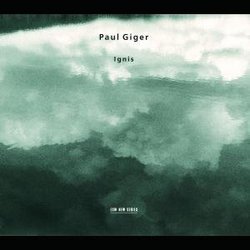Umberto
03/08/2001
(5 out of 5 stars)
"This is a rather puzzling disc. The music does not seem to have any obvious main reference (classical, oriental, etc.). It is highly original and, at first listen, slightly disorientating. At times the same notes or drones are held for interminable periods of times, other times the music seems to stop only to restart again. The overall effect, however, is quite fascinating and intriguing, often with an hypnotic feel. Obviously the performers are first rate and the disc is a pleasure to listen to after adjusting to its unconvential musical structure. Lovers of Part and modern minimalists might like this. A minor quibble is the presence of background noises on some of the pieces which were recorded live. Although the composer claims they don't interfere with the music, they are slightly annoying on a high resolution system."
Well played, superficially hypnotic but rather hollow music
G.D. | Norway | 02/17/2009
(3 out of 5 stars)
"I am unsure whether I am the right person to review this one. This is in many respects more a moody cross-over disc for new age contemplation than actual art music, and by reviewing it as serious art music (as I will) it does in many respects fall short. There are surely many people out there who will enjoy it - and I did find things to savour here myself as well - but it is in the end rather forgettable. In order to keep no agenda hidden, I should also disclose my opinion on the apparent purpose here: I hope composers will, as soon as possible, eschew this new-agey childish and insubstantial obsession with "spirituality" (the kind of trendy new-age-religiosity that undeniably permeats this disc as well). It is painfully obvious that the philosophical abilities of many of these composers (Tavener, Pärt etc) are slim, and framing their embarrassingly confused ideas in music with unequivocal seriousity and honest intents does add an ineliminable level of silliness to the music in question.
The music here is all based on various early music works dating from the 10th-13th centuries, notably Hildegard, but Paul Giger has carried them into a recognizably contemporary sphere. Organum might bring the thoughts to Pärt; it is based on a drone with gradually more complex melodic and harmonic layers put on top. Karma Shadub is probably the best work here, drawing as it does on influences also from Ligeti (at least apparently so); it starts out with choral ruminations with tentative, fleeting shadows of melody before, quite suddenly, gathering momentum and building to a rather satisfying close. O Ignis is based on Hildegard; it takes up the main bulk of the release with slowly moving murmurs, slightly Pärt-like in style, with some surprising outbursts. If this sounds meandering and hollow to you, I think you are right - this is not a work I'd honestly want to hear again. Tropus and Alleluja are more interesting plays with sonorities, but I do not find them very convincing either.
What is undeniably convincing, however, is the performances. The Estonian Philharmonic Chamber Choir is astounding, and the string playing is hardly less accomplished. Sound is resonant, almost cavernous - which apparently was the intention of the composer. Very little is included by way of notes or texts, which frankly serves to bolster my suspicion that this release wasn't really intended for listeners like myself, but rather as some kind of easy listening. If you think the disc sounds appealing, disregard this review and go ahead, but it won't receive more than a qualified recommendation from me."


 Track Listings (5) - Disc #1
Track Listings (5) - Disc #1